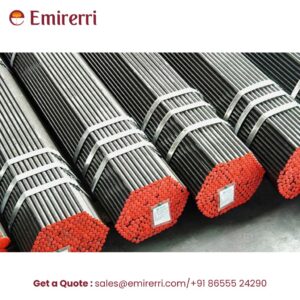ASTM A333 / ASME SA333
ASTM A333 / ASME SA333 Low Temperature Carbon Steel Pipes
At Emirerri Steel, we are a leading manufacturer, supplier, and exporter of ASTM A333 / ASME SA333 Low Temperature Carbon Steel Pipes worldwide. These pipes are specifically designed to perform in low-temperature environments, making them an essential choice for industries such as oil & gas, power generation, chemical processing, and shipbuilding.
The ASTM A333 standard specification covers seamless and welded carbon and alloy steel pipes intended for use at low temperatures. It ensures high toughness and strength, even at temperatures as low as –45°C (–50°F). At Emirerri Steel, we manufacture ASTM A333 / SA333 pipes with strict adherence to international quality standards, ensuring durability, reliability, and superior performance.

Key Features
Excellent low-temperature toughness
High dimensional accuracy
Good weldability and formability
Available in seamless and welded types
Suitable for cryogenic applications
Manufactured in compliance with ASTM A333 / ASME SA333 standards
Available Grades of ASTM A333 / SA333
Equivalent Standards of ASTM A333 / SA333
ASME SA333 – Boiler and Pressure Vessel Code equivalent
EN 10216-4 – European equivalent for low-temperature seamless steel tubes
DIN 17173 – German standard for low-temperature pipes
BS 3603 – British equivalent
Heat Treatment
Normalized or normalized and tempered
Quenched and tempered (for specific grades)
Heat treatment ensures the required mechanical properties and low-temperature impact resistance.
Manufacturing Types
Seamless Pipes – Produced by hot rolling and cold drawing processes for high precision and strength.
Welded Pipes – Manufactured using ERW, LSAW, or SSAW welding techniques.
Supply Range
Product Form: Seamless / Welded Pipes
Pipe Ends: Plain End (PE), Beveled End (BE), Threaded End (TE)
Surface Finish: Bare, Black Coated, Galvanized, Varnished, or as specified
Delivery Condition: Hot finished or cold drawn
Applications
Oil & Gas Industry: Pipeline transportation of natural gas and petroleum products at low temperatures.
Petrochemical Industry: Storage tanks, cryogenic vessels, and processing equipment.
Power Generation: Heat exchangers, boilers, and condensers operating in cold environments.
Shipbuilding & Offshore Industry: LNG carriers, offshore structures, and subsea equipment.
Fertilizer Industry: Low-temperature process piping.
Refineries & Chemical Plants: Safe transportation of chemicals at low temperatures.
